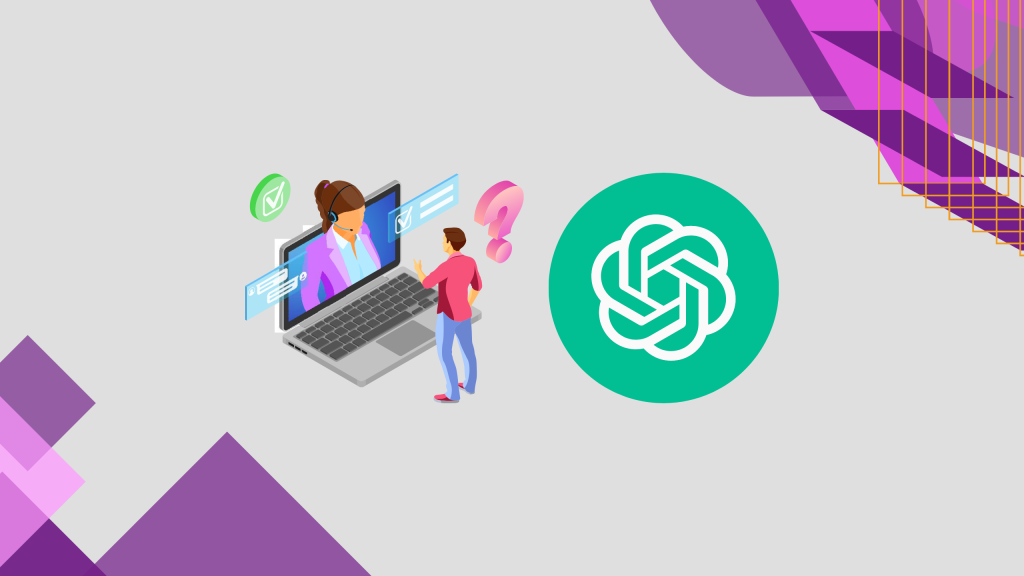
Businesses are constantly seeking innovative solutions to meet the evolving needs and expectations of their customers. One such solution that has gained significant traction is the use of digital virtual agents. These intelligent and interactive systems have proven to be an effective tool for enhancing customer satisfaction. By leveraging cutting-edge technologies such as artificial intelligence and natural language processing, businesses can provide personalized and efficient customer service experiences.
The Importance of Customer Satisfaction
Customer satisfaction can have a significant impact on the success of a business. After all, 65% of business comes from a company’s existing customers. High customer satisfaction leads to greater customer retention, which can help businesses earn more money and increase sales. When customers are pleased with their customer journey they are more willing to repeat the process with the same organization, should the need arise again.
Conversely, 72% of customers switch to a competitor after just one bad experience with a company or their customer service. It is easier and much more cost-effective to work with existing customers than it is to acquire new ones. One way technology is helping organizations to do that is through the implementation of virtual agents.
Round-the-Clock Support
One of the key advantages of digital virtual agents is their ability to provide instantaneous support to customers. Unlike traditional customer service channels that operate within specific business hours, virtual agents can be available 24/7. This accessibility ensures that customers can receive assistance whenever they need it, regardless of time zones or geographical locations. By eliminating delays in response time, virtual agents contribute to higher customer satisfaction rates and overall improved customer experiences.
The Rise of The Machines
Gartner reported that in 2017, virtual agents had around a 2% adoption rate and predicted that by 2020 that number would jump to 25%. With shortages in various sectors, virtual agent automation is in even higher demand. Conversational AI is being deployed to customers around the world to support operations and reduce cost. Labor shortages can have a huge effect on operations as interaction with a customer support agent accounts for up to 95% of the customer’s journey in customer support.

Gartner now projects that one in 10 interactions from customer support centers will be automated by 2026. That is an increase from the estimated 1.6% interactions seen today. Conversational AI can automate all or part of a support center’s customer interactions with customers via voice and digital channels, using voicebots or chatbots.
Personalized Interactions
Digital virtual agents have the ability to offer personalized interactions, simulating human-like conversations. Through advanced algorithms and machine learning, these agents can analyze customer data and historical interactions to deliver tailored recommendations and solutions. By understanding customer preferences and needs, virtual agents can provide more relevant and targeted assistance, leading to higher levels of customer satisfaction. This personalized approach makes customers feel valued and understood, enhancing their overall experience with the brand.
Increased Efficiency and Consistency
Traditional customer service often relies on human agents who are susceptible to human errors, fatigue, and inconsistencies in their responses. On the other hand, digital virtual agents offer a consistent and efficient customer service experience. These agents can handle multiple customer inquiries simultaneously and provide accurate and standardized responses every time. By automating routine tasks and providing quick resolutions, virtual agents free up human agents to focus on more complex issues, leading to increased productivity and improved customer satisfaction.
Seamless Omnichannel Experience
Virtual agents can be integrated across various platforms, allowing customers to interact with them through their preferred channels. Whether it’s through a website chatbot or a messaging app, virtual agents provide consistent support and information, regardless of the channel. This flexibility enhances convenience and customer satisfaction by meeting customers’ expectations for a unified and effortless experience across all touchpoints.
Continuous Learning and Improvement
Virtual agents can learn and improve over time through machine learning algorithms and data analysis. By analyzing customer interactions and feedback, virtual agents can identify patterns, trends, and areas for improvement. This constant learning enables virtual agents to evolve and enhance their responses and recommendations, leading to more accurate and helpful assistance for customers. The ability to continuously learn and adapt ensures that customer satisfaction remains a top priority, as virtual agents improve their performance based on real-time insights.
Adopting AI Automation Via Virtual Agents
AI automation for virtual assistance is expected to really take off within the next two years. How quickly any particular organization takes to adopt this technology depends on their budget and technical resources. In the early days of AI adoption, rollout for some projects could be measured in years. Now, with advances in artificial intelligence and ChatGPT that time frame is greatly reduced along with the costs.
What Are Some Industries That Are Adopting Virtual Agents?
Here are some industries that are currently benefiting from virtual customer support staff:
- Health care – virtual agents are being used to improve patient services and enable self-care.
- Travel – Virtual assistants for travel agents are independent contractors who perform administrative tasks and help with travel arrangements while finding the best deals.
- Gaming – Virtual agents help in gaming by boosting customer service efforts and to provide better virtual companions in-game.
- IT and technology – virtual assistants are being used to provide virtual helpdesk staff to quickly get users through basic troubleshooting while reducing downtime and bottlenecks in IT support.
Some of the top names in SaaS have taken to implementing virtual agents into their product offerings in order to best serve associated use cases. That means some applications that you might already know and love will have additional AI-driven features in order to enhance your experience. Let’s take a look at what’s happening now.
Zoom Virtual Agent

Zoom has partnered with Anthropic to integrate its AI virtual assistant, Claude, into the Zoom Contact Center platform, which includes Virtual Agent and Workforce Management. The integration aims to enable Zoom customers to improve service to their customers by making contact center operations more efficient and by providing AI integration in the contact center.
Zoom Ventures has invested in Anthropic, and the exact amount was not disclosed. The partnership will expand Zoom’s federated approach to AI, and Anthropic’s AI model will help strengthen Zoom’s federated approach across its platform, including Zoom Contact Center integrations. As part of the partnership, Zoom will collaborate with Anthropic to improve its use of AI.
Zoom’s approach to AI combines in-house developed technology and partnerships, and the company uses AI models from its in-house team and from partners like Anthropic. The integration of Anthropic’s AI virtual assistant, Claude, will help Zoom’s customers to improve contact center efficiency and provide AI integration.
TeleVox
TeleVox is a company that provides an omnichannel digital patient engagement platform for healthcare organizations. In April 2023, TeleVox launched Iris, an AI-enabled virtual agent that can be accessed via web, voice, and SMS interactions and is embedded into their HouseCalls Pro patient engagement platform. Iris is designed to significantly enhance the patient experience while addressing serious operational shortfalls in healthcare organizations.
It reduces staff workload by automating patient interactions and is capable of interacting with patients through text, virtual assistant, interactive voice response (IVR), email, and postcards. Iris is powered by conversational AI and is intended to improve care continuity, reduce the operational burden on staff, and drive revenue.
Krafton
The purpose of Krafton’s virtual agents is to engage a global audience and help establish Krafton’s Web 3.0 ecosystem. The virtual agents are hyper-realistic virtual humans that leverage AI to move and interact with humans as virtual friends and game show hosts. The virtual humans are designed to represent real people in the virtual world and play an essential role in the Metaverse.
Krafton plans to set its virtual agents up on its new metaverse platform, called “Interactive Virtual World,” and deploy them across its business, including entertainment and esports. The virtual agents are synthetically generated and powered by conversational AI to interact with people exploring the digital worlds of the metaverse.
Ana, Krafton’s first virtual human, was developed using hyperrealism production technology of Unreal Engine and displays a hyper-realistic appearance, blurring the lines between a digital and physical world. The aim of Krafton’s virtual agents is to create a high-end content that can be realized with hyper-realism technology and provide a unique experience for users in the metaverse.
Microsoft Power Virtual Agents
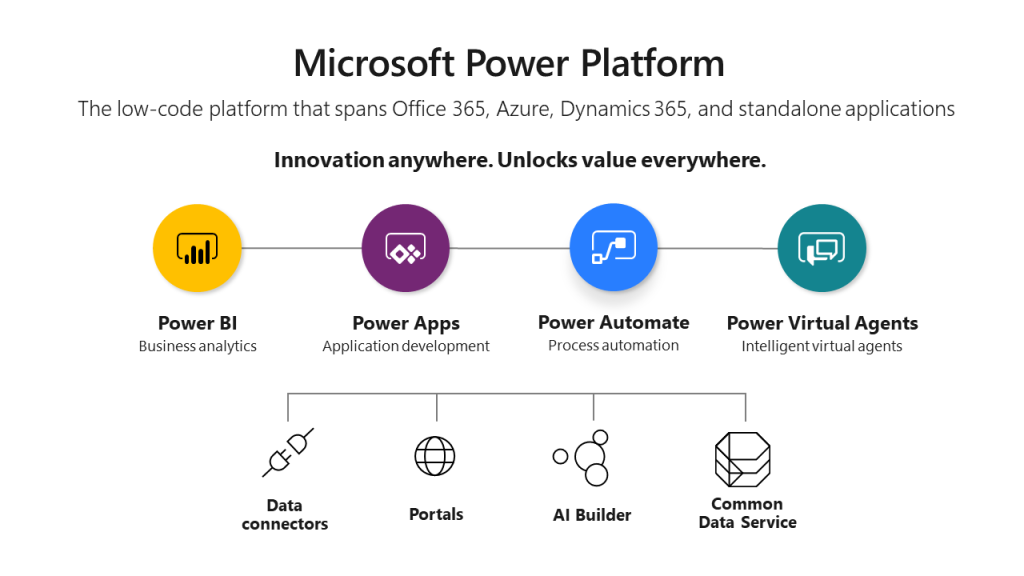
Microsoft’s Power Virtual Agents enables businesses to create customisable artificial intelligence (AI) chatbots without the need for data scientists or developers. It is a platform that allows users to create powerful AI-powered chatbots for a range of requests from providing simple answers to common questions to resolving issues requiring complex conversations. Power Virtual Agents is a guided, no-code graphical interface that simplifies the process of creating chatbots, making it easy for subject matter experts to create bots quickly and easily.
These bots can be embedded on websites, mobile apps, Facebook, Microsoft Teams, or any channel supported by the Azure Bot Framework. Power Virtual Agents includes a range of features such as pre-built templates, natural language processing, and integration with other Microsoft tools like Power Automate. With Power Virtual Agents, businesses can respond rapidly to customer and employee needs-at scale-with intelligent conversational bots.
SolarWinds Virtual Agent
SolarWinds Virtual Agent is a conversational self-service chatbot available with SolarWinds Service Desk. It is a conversational, 24/7, self-service chatbot that uses artificial intelligence (AI) technology to solve users’ problems. The Virtual Agent is available in the Advanced and Premier packages. It works alongside live agents and can help users solve everyday IT problems. With the Virtual Agent, admins can define approved processes as runbooks. A runbook is a set of procedures that describe how to carry out a particular task.
Are You Interested In Adding Virtual Agents To Your Organization?
There are several cost-effective solutions for bringing the power of AI to your customer service platform. Use virtual agents to help your customers and automate parts of the journey for better customer satisfaction. Let’s take a look at a few AI tools that can get the job done.
Chatbase
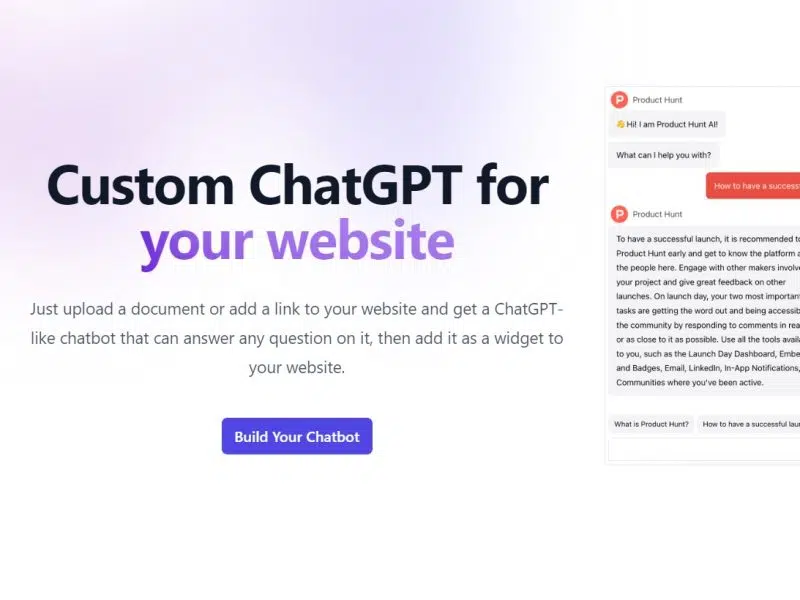
Chatbase is an AI chatbot builder that trains ChatGPT on your data, allowing you to add a chat widget to your website. With Chatbase, you can upload documents or provide a link to your website, and the chatbot will be trained to answer questions about the content. It supports multiple file formats, including PDF, TXT, DOC, and DOCX, and it can also scrape website content. You have the ability to customize the chatbot’s prompt, name, personality traits, and language instructions. The chatbot uses ChatGPT (gpt-3.5-turbo) by default and can be embedded on your website using an iframe or a chat bubble. It supports approximately 95 languages, and you can choose to keep your chatbot private or make it public and share it with others.
CustomGPT AI
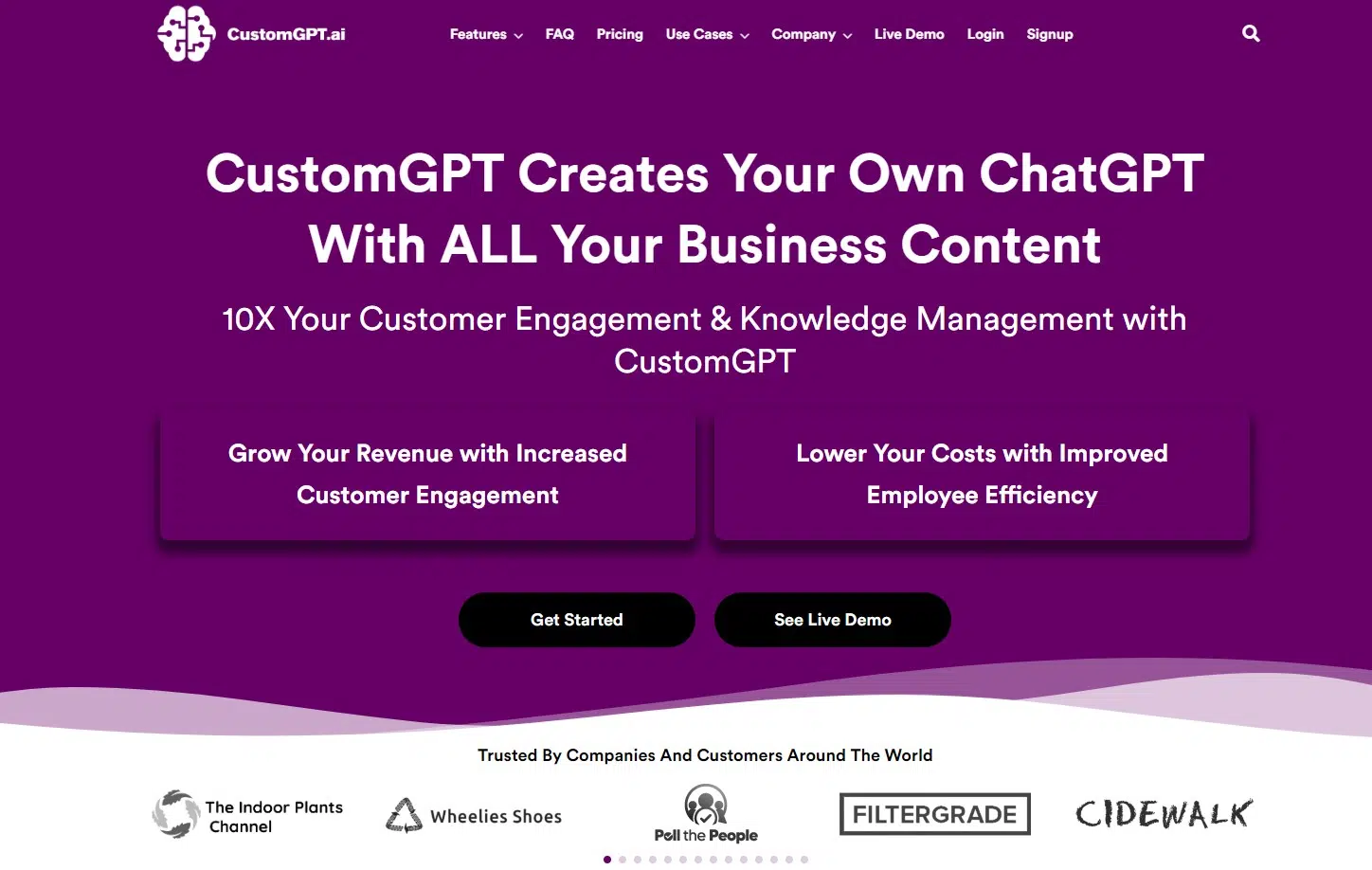
CustomGPT AI is powered by GPT-4 technology, allowing it to understand context and generate accurate responses. It is used to build custom AI applications that can answer questions based on a specific knowledge base. CustomGPT AI is a useful tool for businesses that want to provide instant answers to their customers based on their specific knowledge base. It can be used to build chatbots, Q&A bots, and other AI applications that can improve customer experience and increase sales.
Chatbotkit
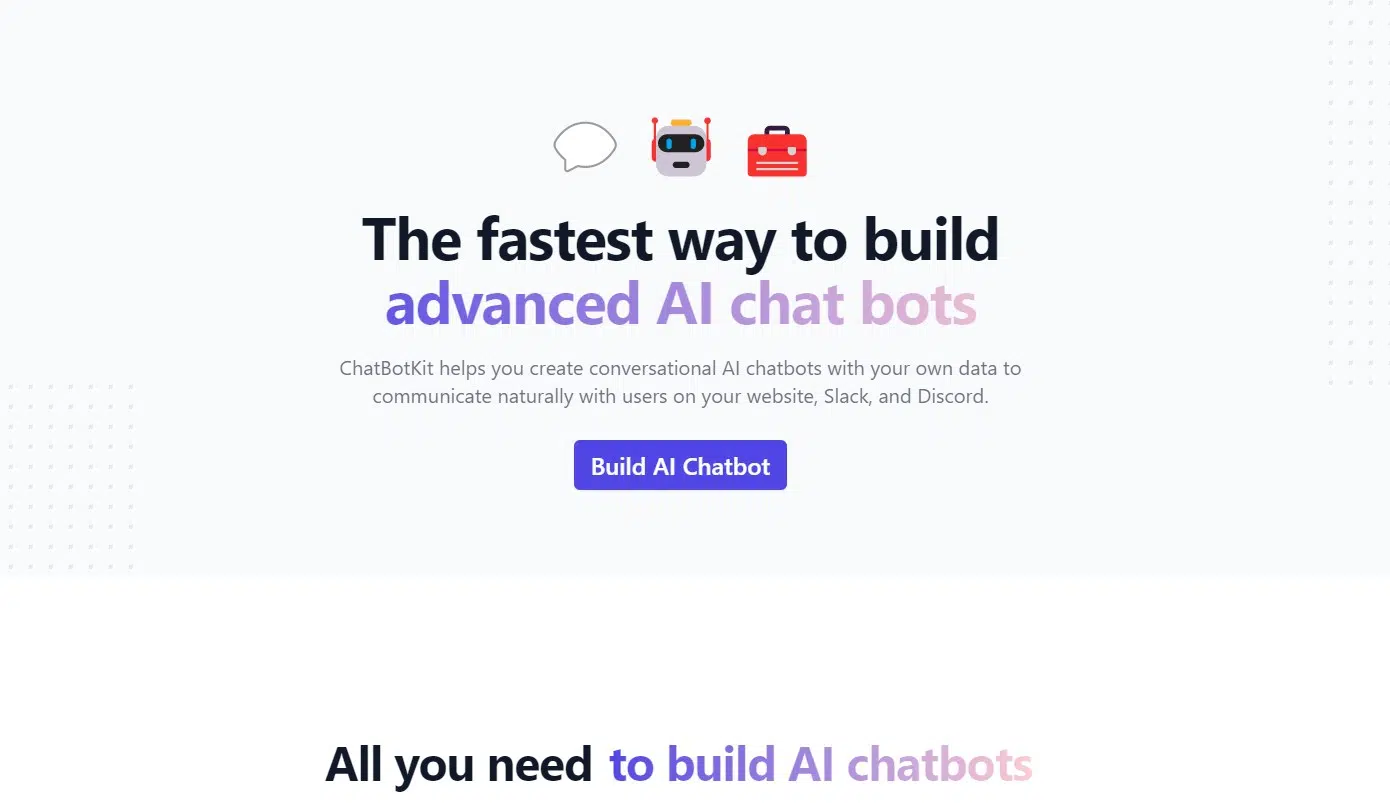
ChatBotKit is a platform that helps users create conversational AI chatbots with their own data to communicate naturally with users on their website, Slack, and Discord. ChatBotKit allows users to easily review and reference previous conversations with their bots, ensuring that it has all the information it needs. It offers a no-coding-required solution, chat history, simple pricing, and an app platform for building and deploying chatbots for a wide range of applications.
Botsonic
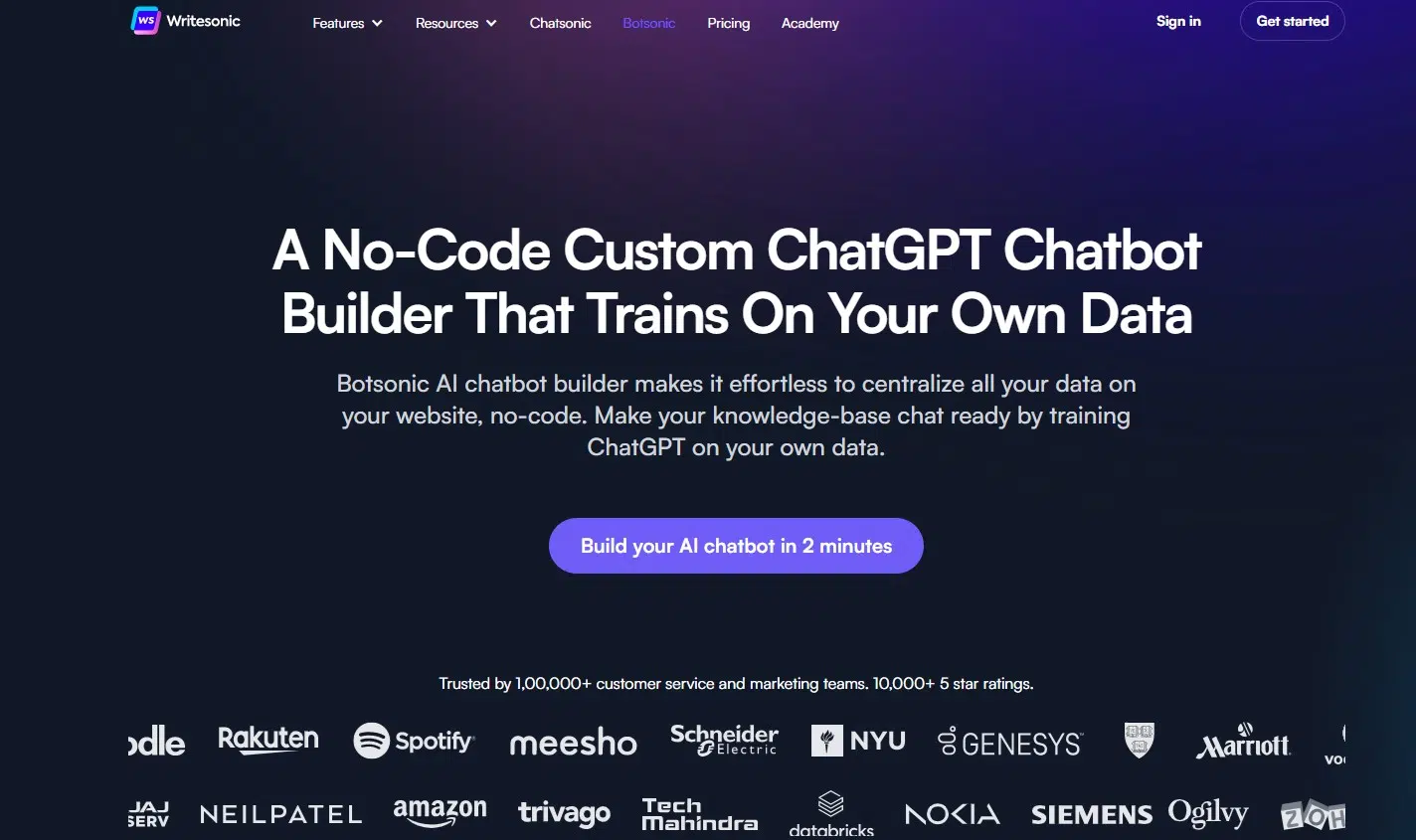
Botsonic is an AI chatbot that enables businesses to interact with users through natural language conversations. It is a custom AI chatbot builder that helps businesses train ChatGPT on their own website data to provide seamless customer service. Botsonic is powered by the latest GPT-4 technology and is a no-code chatbot builder that can be implemented on online platforms as a personal AI customer enhancement executive quickly and easily without any hardcore coding.
KODIF
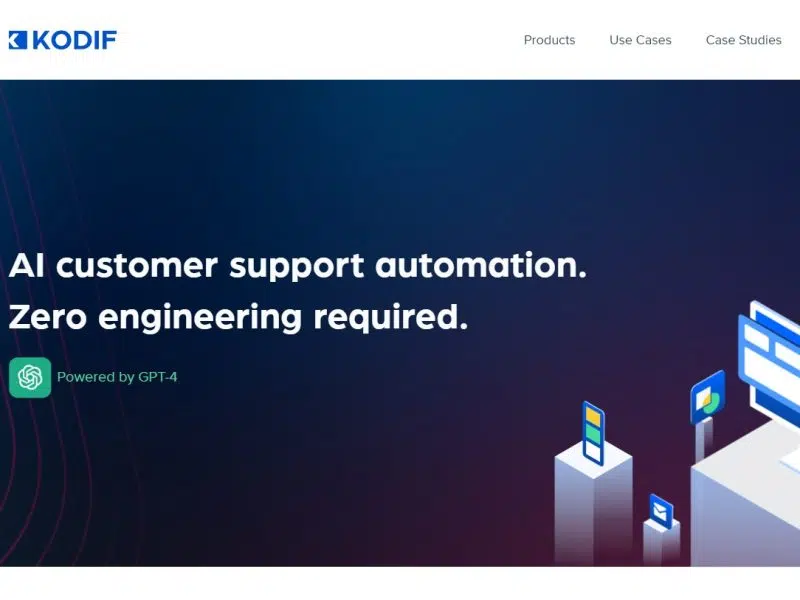
Kodif is a workflow and response generator that can take data and help support agents solve tickets quickly and efficiently in a way that customers will appreciate. In the context of customer support, Kodif automates responses in customer support by using generative AI and chatbots to provide self-service options and AI agent assistance
It highlights important information such as recent order or shipping numbers, product usage data, and account information within their helpdesk software. Kodif can help reduce the waiting time for customers and facilitate the process of providing resolutions to specific customer queries.
Fini AI
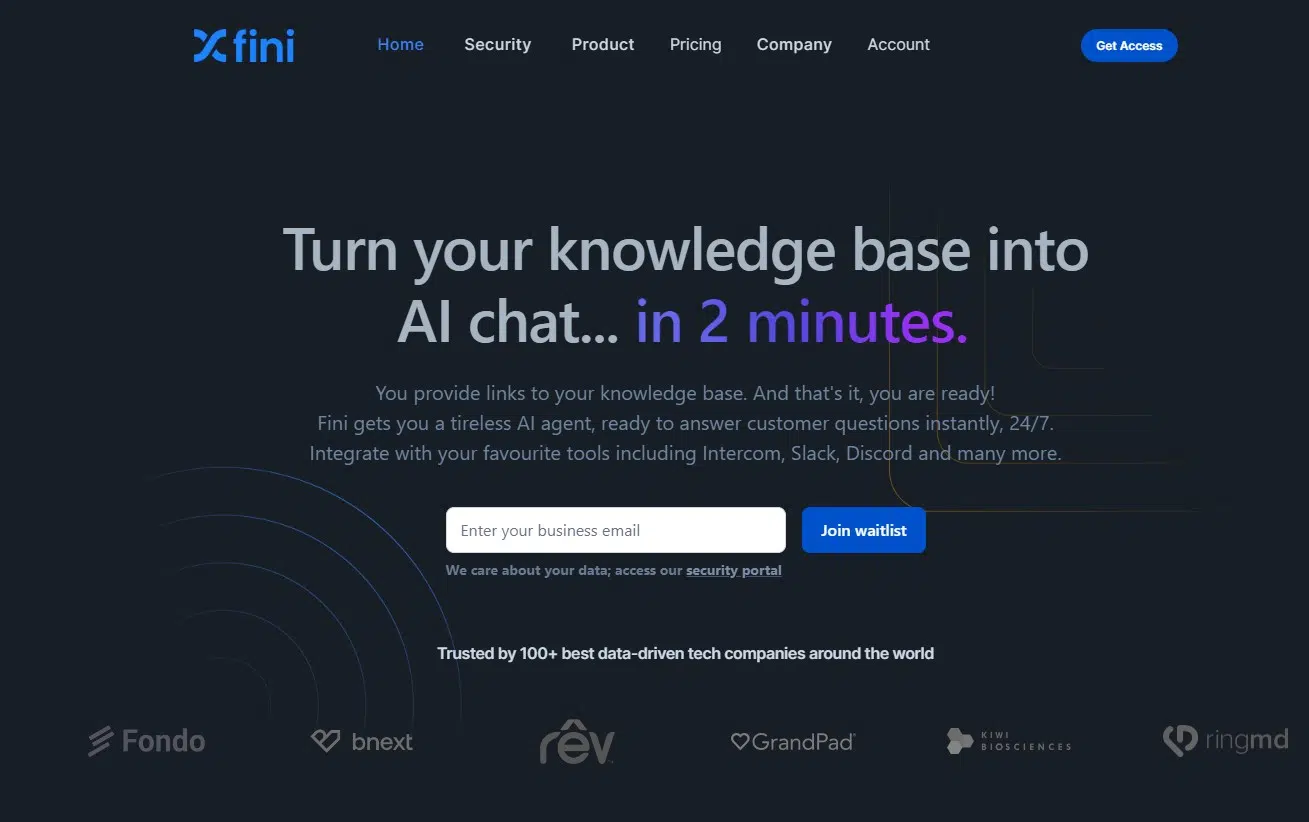
Fini AI is a tool for virtual agents in customer support that provides AI capabilities for customer support automation. It transforms your knowledge base into an AI virtual agent, providing instant answers and a seamless user experience without any integration required. Customize the tone, persona, and specific questions your AI chat agent can answer. Automatically route customers to a human agent when the AI chat agent doesn’t know the answer or for pre-configured topics.
Fini can be deployed on various platforms, including Intercom, Slack, and Discord, to reach your customers wherever they are. Continuously improve the AI virtual agent’s responses by learning from customer interactions, for scalability and growth.
ChatWizard
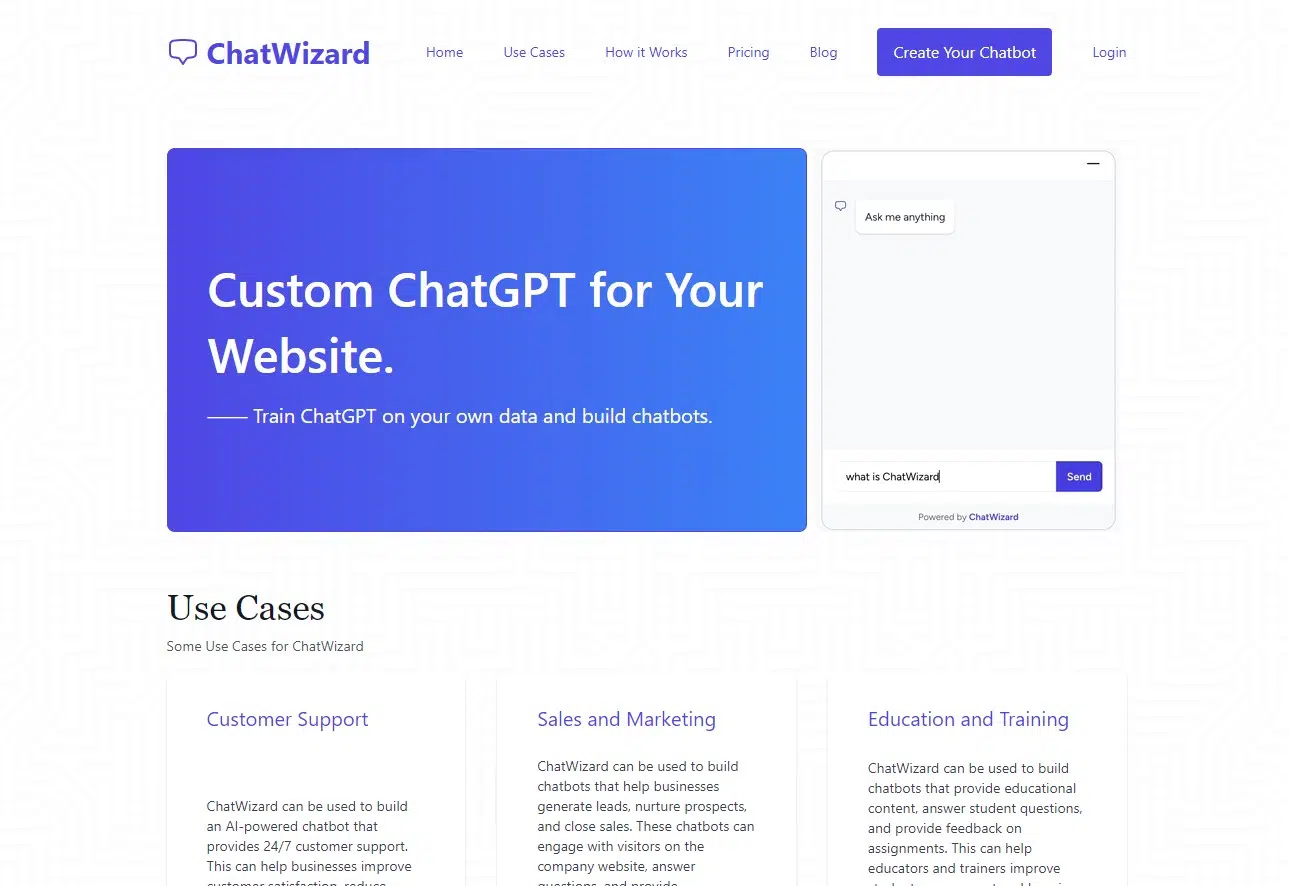
ChatWizard is a chatbot that answers basic customer questions via a business messenger. It is targeted towards customer service, sales and marketing and education/training.
For customer service it can help businesses improve customer satisfaction, reduce response times and cut down on workload. For sales ChatWizard can generate leads, nurture prospects, and close sales. In the education sector, it can be used to build chatbots that provide educational content, answer student questions, and provide feedback on assignments.
SupportGuy

This is another website integration tool. Embed a messenger into your website for 24/7 customer service. SupportGuy chatbot can provide instant responses to customer inquiries, freeing up support agents to tackle more complex queries. Your own virtual travel agent, travel specialists can assist in planning and creating a travel package according to the traveler’s needs and requirements.
You can continually train SupportGuy by managing its knowledge base by uploading documents or web pages to add new information to the virtual agent’s database. Overall, SupportGuy chatbot is a versatile tool that can handle a variety of tasks related to customer support, providing businesses with faster resolutions, always-on support, and improved efficiency.
osher.ai
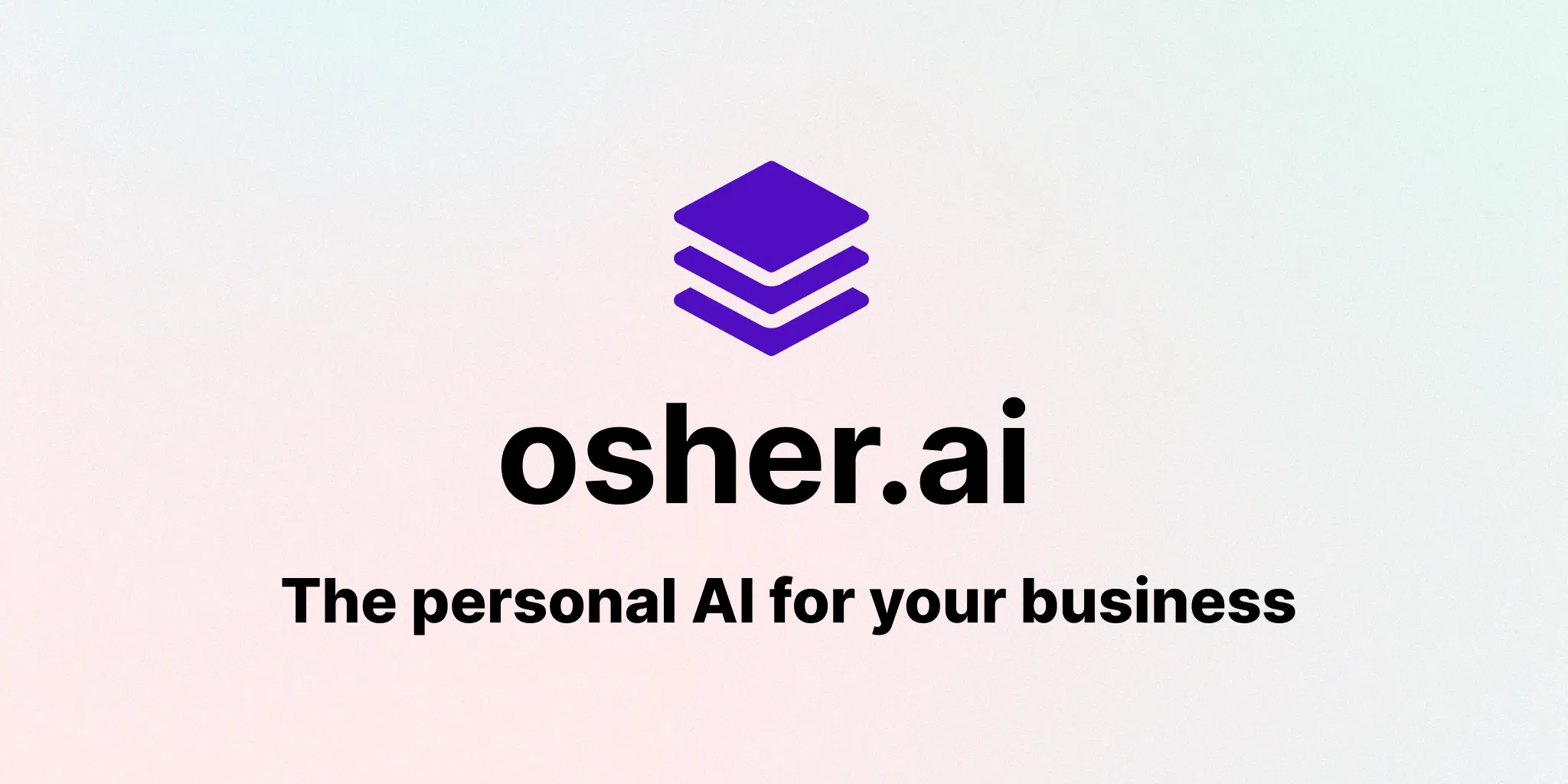
Osher.ai virtual agent is an AI-powered chatbot that can help businesses improve their customer support and provide a better customer experience. The virtual agent can grasp the intent behind customer inquiries and provide personalized responses. Osher.ai virtual agents can act independently and provide meaningful experiences through unscripted dialogue within a specific content field.
They can act as the first line of customer support or be configured to handle support requests with limited to no human agent intervention. Virtual agents and conversational AI can automate the process of capturing user technology issues, providing more access to information and answers, and improving the customer experience. Overall, Osher.ai virtual agent uses AI to personalize responses for customers by analyzing customer data, grasping intent, and providing unique personalities, among other techniques.
YouKnowMe
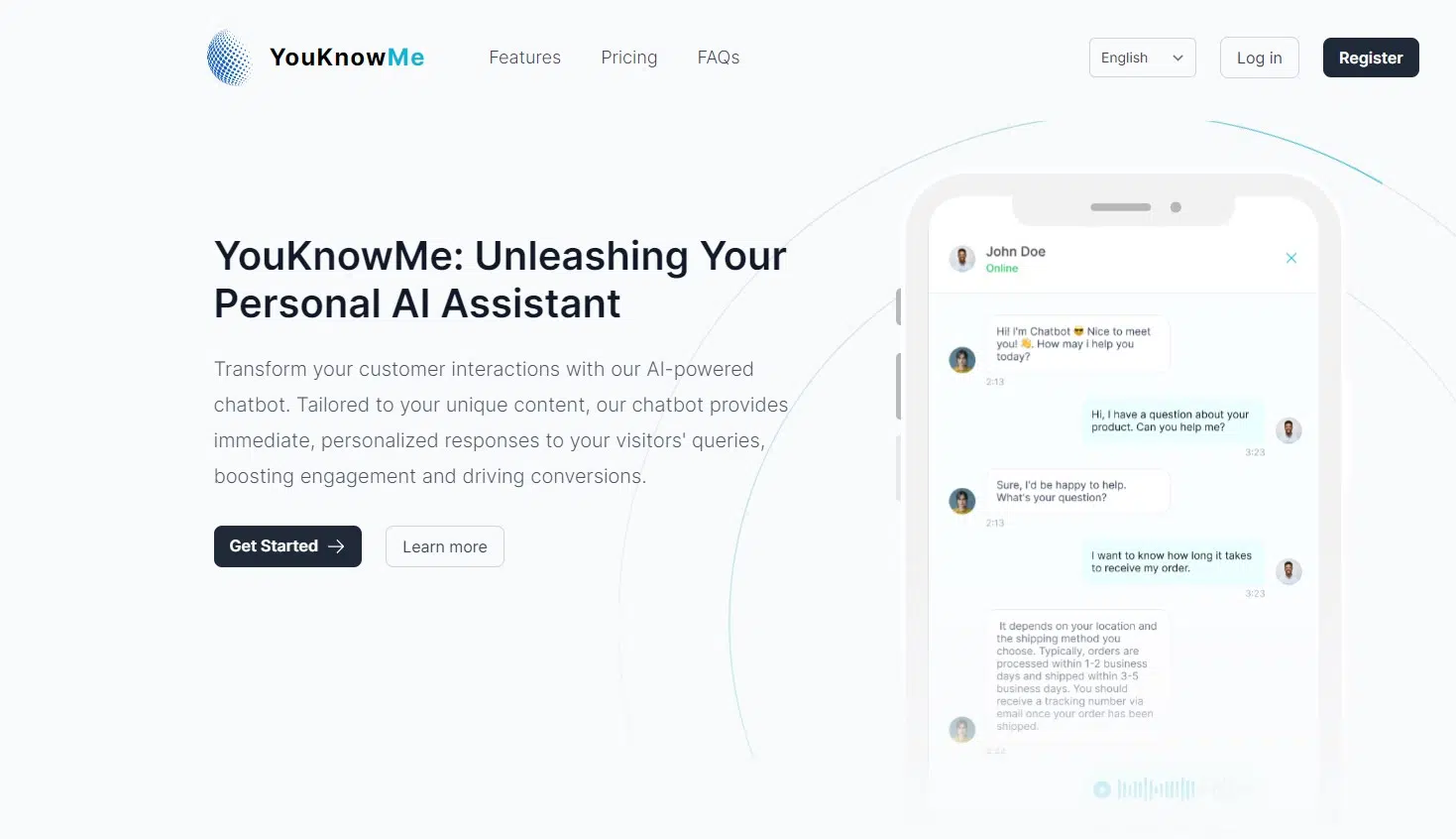
YouKnowMe AI is a conversational AI platform to create virtual agents that can engage in content-specific, unscripted dialogue with users. Virtual agents can grasp the intent behind customer inquiries and provide personalized responses. It excels at handling repetitive tasks, such as sorting support tickets and providing self-service options.
Ivy.ai
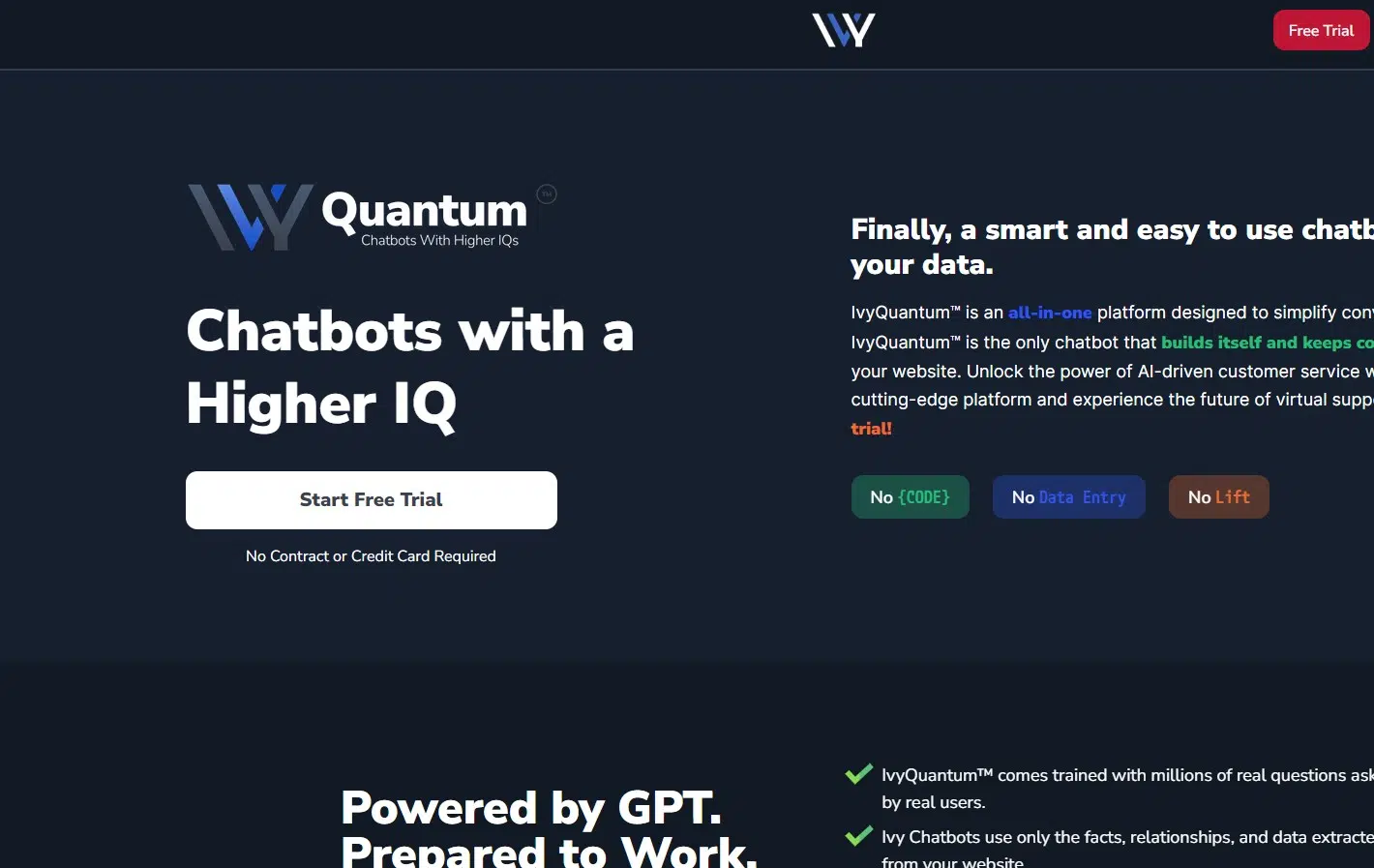
Ivy.ai is a conversational AI platform that provides chatbots for higher education institutions to streamline resources and policies related to name, image, and likeness through its chatbot to provide a seamless experience for student-athletes. Ivy.ai’s chatbot can digest all relevant policy information and provide answers to student-athletes at any time on any device.
The chatbot can also answer inquiries related to compliance, financial aid impact, how-to documents, and best practice training videos. That means athletic departments can reduce inbound inquiries while answering inquiries related to compliance. Ivy.ai’s multimedia presentation allows universities to embed YouTube videos, PDFs, and interactive content to deliver a wide range of information to students. Implementation is meant to be straightforward, with just a few lines of code, institutions can deliver a far superior customer experience than before.
Conclusion
Organizations are continuously exploring innovative ways to enhance customer satisfaction. AI-powered virtual agents provide personalized and efficient customer service experiences by analyzing customer data and delivering tailored interactions. Moreover, their round-the-clock availability ensures instant support, further contributing to customer satisfaction. With consistent and accurate responses, virtual agents eliminate human errors and provide seamless omnichannel experiences.
Additionally, their ability to learn and improve over time ensures continuous enhancements in customer service. By harnessing the power of AI-powered virtual agents, businesses can significantly elevate customer satisfaction levels and build long-lasting relationships with their customers.
Kevin is a digital marketing expert with a previous 10 years worth of experience working in IT. He understands the nuances of sourcing the right IT resources to drive results for organizations.
